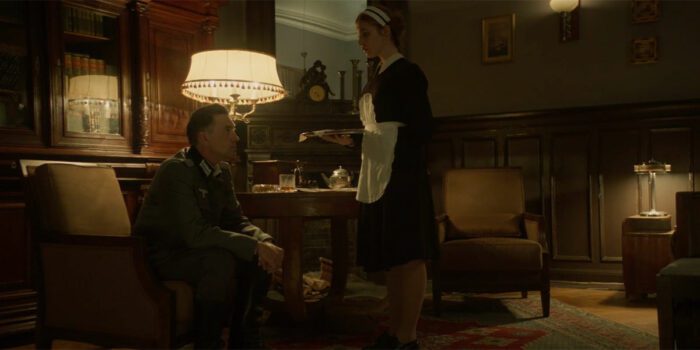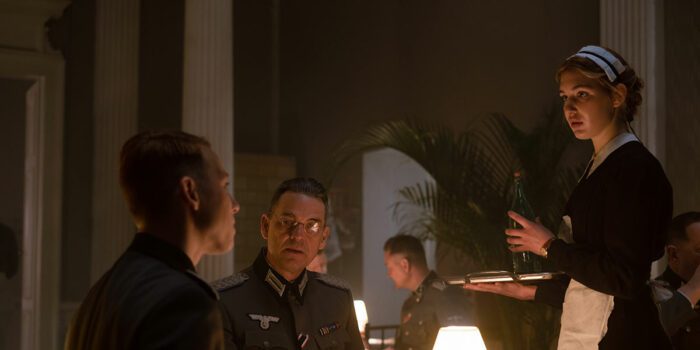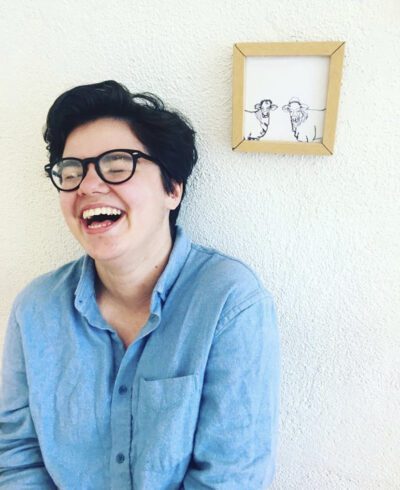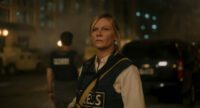For the past few years, Sophie Nélisse has been making waves in Yellowjackets as Shauna, one of the high school soccer team members whose plane crashed somewhere in the Canadian wilderness. However, her breakthrough role came in 2013 when she led the adaptation of The Book Thief. Now, Nélisse is returning to the same historical era as that breakthrough performance with the upcoming Irena’s Vow.
After its premiere at the 2023 Toronto International Film Festival, Irena’s Vow will have a nationwide release on April 15th and 16th. The film centers on Irena Gut (Nélisse), a nineteen-year-old Polish nurse who finds herself as the housekeeper to a Nazi officer (Dougray Scott). Despite living in close proximity to such a high ranking Nazi official, Irena decides to protect twelve Jewish people by hiding them in the cellar. It’s a daring, dangerous decision, but one she knows is right.
In anticipation of the upcoming release, Nélisse sat down with Film Obsessive’s Tina Kakadelis to talk about the pressures of portraying a real person, what we can learn from Irena’s story, and how she handles the weight of intense roles. The transcript has been edited for length and clarity.
Film Obsessive: This is your first feature project since starting Yellowjackets and the whirlwind that has become. How did it feel stepping onto this set as kind of a new character and a new beginning?
Sophie Nélisse: I’ve had my fair share of work beforehand. I did multiple movies, but one called The Book Thief, that was in the same vein as Irena’s Vow which also talked about World War II and the Holocaust. I thought I already had a good amount of research regarding the subject under my belt. I had watched already all the Holocaust movies, the classics like Schindler’s List and The Boy in the Striped Pajamas. This was definitely a lot more pressure on my shoulders because it was my first time doing a biography of a real woman that existed. Not only that, but she has such an incredible life and it was very stressful to live up to the the life that she’s led, live up to the expectations, and also to give an accurate representation knowing that her daughter and some of her close friends are still alive and were going to watch this movie.
I was going to ask about that. How it felt returning to the same era as The Book Thief now as an adult knowing more and being more aware of the historical context of it. When you were younger, it was probably a little bit more abstract as opposed to now, which probably felt more real.
It’s funny, I did The Book Thief at that age and now I’ve grown and I’m doing like the continuity of Liesel (Nélisse’s character in The Book Thief). I think both of these characters are similar in so many ways. I feel like having ten years later grown and matured, I think I understand the ramifications of it all a little more and have a better understanding of how grand it all was. As a society, we look at the Holocaust and it feels so far away and so remote from us. What was interesting this time around is that we shot on the border of Ukraine while the war was happening and so it war felt so close to us. We had refugees at our hotel and soldiers at our hotel. I had a way better understanding of how dangerous it is and how real and close to us it is. I saw what these people are going through and seeing these people that haven’t been able to contact their relatives their families. It definitely felt very emotional on set.

You mentioned that there’s already some pressure because Irena is a real person and she does have living family members. Did you read her memoir or watch some television appearances to prepare, or did you just go from the script?
I read her memoir. I wanted to have a better understanding of the life that she’d led before the war and I was also interested in the life that she led after everything that happened. I was very lucky to find a few archives on the internet of, like you said, TV appearances, her in interviews. I also worked with a dialect coach to lock down the Polish accent.
As an actor and as someone who wants to do an artistic performance, how do you balance wanting it to be a good performance and then also wanting to honor the person who lived and their legacy?
I think it’s trying to be as accurate as possible, but also adding a touch of uniqueness. Making it unique and making it your own. I think what I discussed with Louise [Archambault] when I watched the interviews of Irena was that she was so full of light and was such a positive person in all her of her TV appearances. She just seemed to see the best in people and the best in life despite everything she’d gone through. I think that was important to me to add to the script that wasn’t initially written. It’s a lot about the traumatic event and what she’d gone through, but it was important for us to add moments of lightness that aren’t necessarily comical, but that definitely like elevate the movie a little bit and bring some lightness. We wanted to see a softer side of her and a caring side. Despite that she always had to keep this stern facade and the strong front, we wanted to see moments where she’s softer and just more nurturing.
After spending so much time with her and her story, it sounds like her ability to find light in darkness really stuck out to you. Is there some aspect of her that has stayed with you since making the film?
Yeah, I think what was really inspiring to me when I read the script was that I think it’s just so relevant to our society to this day. I think we are so caught up in our own lives and egos. We are all egocentric in a way. I think we don’t take the time to look around and to go out of our way to help someone else. She really inspired me to be a little bit more like that., to just be more empathetic and curious about other people’s differences. We’re so quick to judge instead of understanding where other people come from with their different political opinions or religions and values. Instead of judging, we should want to start a conversation to try to understand. I think that if we were all a little bit more like her, we would live as a society in harmony a little bit more. I try to, in my daily life, be a little bit more conscious of that. If I can do even the slightest thing to help someone, it doesn’t not to be as big as her, but to just give a compliment or open the door to someone. I’m definitely a lot more aware of that in my daily life. Absolutely.

One of the things that struck me about her story is that she’s 19. I thought that was just absolutely wild. Do you feel like her age was a strength or a weakness in this decision that she made in saving these people?
I think it was a strength because I think you’re a little more, in a good way, a little more naive at that age. A little less, aware maybe of the realm of occasions or repercussions. So, I think, yes, maybe she was, a little naive, but I think that’s what made her take these decisions in such a spontaneous way. She didn’t even think about it twice in her head. It was like, I want to save them, I will save them regardless. Certainly, from nineteen to where I’m at today, I have a lot more anxiety. I’m a lot more self-aware. I never had anxiety until my later twenties. Now I’m like, what is this thing called anxiety? Why am I overthinking every discussion? I reflect on absolutely everything which I didn’t used to do when I was nineteen. As you get older, if you had a family, maybe you wouldn’t be so prone to, like, risking your entire family’s life to save others. I think her spontaneous, naive side maybe made her a little more reckless.
Your filmography is filled with pretty intense works. I just watched The Kid Detective this week and even that has a devastating twist in it. What draws you to these characters? Also, how do you protect your own mental health when the camera stops rolling?
(Laughs) Yeah, I have chosen a lot of darker projects. I would love, by the way, to do some comedy. I don’t know why I always get all the dramas. I like to choose roles that the characters will have an impact on the audience. I love roles that stick with me afterwards. I love watching movies that make me reflect and I think that’s maybe why I choose characters that are, in a way, very destabilizing. Is that a word in English? Sorry, I’m French (laughs). The kind of characters that shock you, stick with you, and make you reflect. I think that’s maybe why I go for very dramatic, driven stories. Doing the research for Irena’s Vow, that was actually very sad because I was doing all of the classics of, Holocaust movies. On set, I would say that I’m not very method. I can tap in and out of character pretty easily. I surround myself by my friends and family that at the end of the day, I just call in and we talk about anything but work. I’m a very, like, goofy person. On set, I like to prank people. I like to, make fun of them in a laughable way. I think that really helps to lighten up. the mood.



